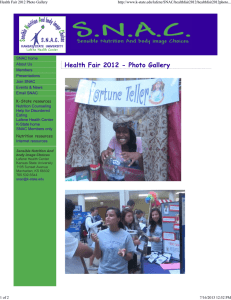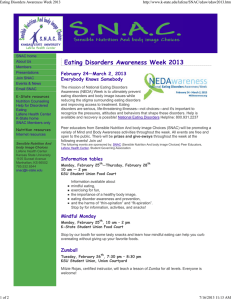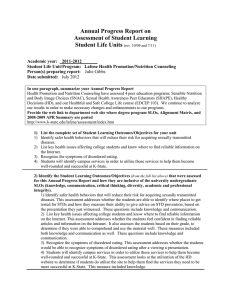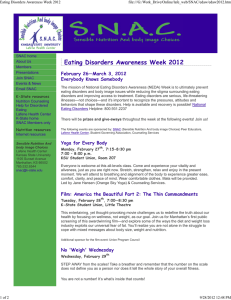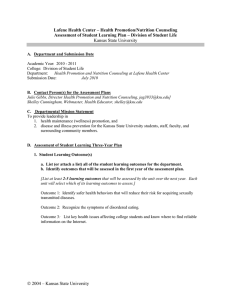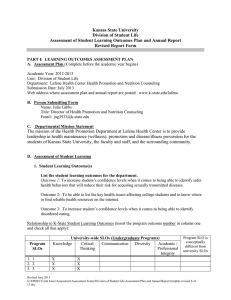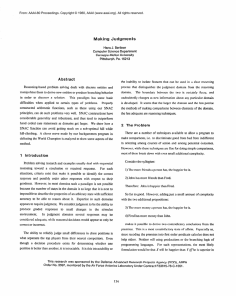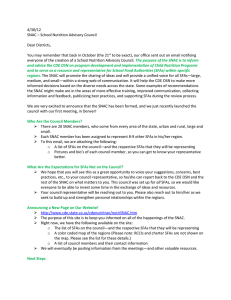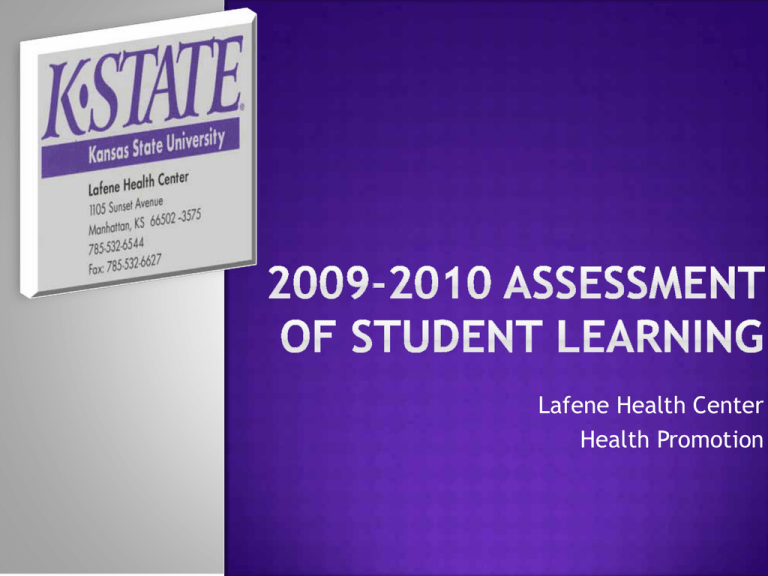
Lafene Health Center
Health Promotion
ž Carol
Kennedy, RN, BSN, MS
Former Director Health Promotion/Nutrition Counseling
ž Julie
Gibbs, MPH
Director Health Promotion/Nutrition Counseling
ž Dianna
Schalles, MS, RD, LD
ž Shelley
Cunningham, RN, BSN, LBSW
“To provide leadership in health
maintenance (wellness) promotion,
and disease and illness prevention
for the Kansas State University
students, staff, faculty, and
surrounding community members.”
www.k-state.edu/lafene/hp_info.htm
www.k-state.edu/lafene/assessment
ž
Identify safer health behaviors that will reduce
their risk for acquiring sexually transmitted
diseases. (Sexual Health Awareness Peer
Education – SHAPE)
ž
Recognize symptoms of disordered eating and/or
exercise. (Sensible Nutrition And body image
Choices – SNAC)
ž
List key health issues affecting college students
and know where to find reliable information on
the internet. (Healthful and Safe College Life –
EDCEP 103)
Members are concerned with:
ž
Assisting peers in need of information on emotional, physical and social
issues regarding Sexually Transmitted Diseases (STD's), including
HIV/AIDS, so as to reduce fears and diffuse prejudices.
ž
Disseminating factual information by providing programs and literature
on STD's and HIV/AIDS while relating it to sexual health and alcohol/drug
issues.
ž
Providing students with an understanding of health-related services
offered by Kansas State University and surrounding communities.
ž
Motivating students by promoting positive attitudes about health and
total wellness.
ž
Striving to meet diverse student's needs by encouraging discussion
surrounding issues of sexuality as it may pertain to diverse student
interests, cultural backgrounds, and beliefs.
In the spring of 2010, 231 participants
completed mini assessments following 8
SHAPE presentations.
90% felt
“confident” or
“very confident”
they could teach
others.
212 of 231 students who
completed the
assessment indicated
that they could identify
2 STD testing locations
in Manhattan, KS.
ž
Results were positive for SHAPE program and
their efforts to increase awareness of sexual
health issues. Over half of the attendees at the
SHAPE presentation completed the post
assessment, 231 of 275.
ž
Limitations:
¡
¡
¡
¡
¡
Other factors
Measured confidence levels
All attendees did not participate in the assessment.
There were fewer presentations given this semester
compared to last.
Only one tool was used to obtain data.
SNAC offers a chance to:
gain experience with health fairs and other interactive exhibits.
gain public speaking experience by giving presentations to
campus and community groups.
get to know other students who share your passion for a healthy,
balanced lifestyle.
participate in planning a campus-wide event to promote National
Eating Disorders Awareness Week.
learn to work effectively as a team to accomplish group goals.
satisfy work experience requirements for dietetics and other
degree programs.
In the spring of 2010, a total of 45 participants
completed assessments following 2 SNAC
presentations.
93% recognized
symptoms of an eating
disorder.
Results were positive for SNAC and the
effects on students with their understanding
on eating/exercise disorders.
One limitation might have been that the
assessment tool was too narrow.
Topics to be covered in the course include:
ž Sexual
Health
ž Nutrition and Fitness
ž Mental Health
ž Alcohol, Drugs, and Tobacco
ž Injury Prevention
ž Illness Prevention
In the spring of 2010, a total of 140
students completed 6 exams and 6 group
discussions in 2 offerings of EDCEP 103.
93% course passing
rate.
Group discussions
reveal students are
finding reliable
health information
and resources on the
internet.
Sample 1: 35/61 (pre); 43/50 (post)
Sample 2: 42/57 (pre); 55/78 (post)
Most
responded
“somewhat
confident” or
“extremely
confident” on
BOTH tests
“extremely
confident”
“somewhat
confident”
Exam grades and discussions reflect that
not only do students know the
information but that they know how to
search for it.
Pre and Post assessments show that
upon completion of the course, students
had an increase in their confidence level
when addressing health issues.
Limitations:
§ Need further evaluation of web sites
§ Did not assess actual student behavior
§ Couldn’t catch all students on pre
assessment
SHAPE assessments reviewed after every
presentation by peers and SHAPE instructor
SNAC assessments reviewed following each
presentation by peers and SNAC instructor
Course exam and group discussion points/grades and
pre and post assessment results reviewed by
instructors
ž
Two questions added to EDCEP 103
assessment.
ž
SNAC assessment tool has been revised to
gather information regarding the broader
categories of requested SNAC programming.
ž All
three programs will continue to be
evaluated in the same manner, with minor
changes to the EDCEP and SNAC evaluation
tools.
QUESTIONS?????

